HMDT Blog: Six ways to be an #ActiveAlly – by Elizabeth Arif-Fear
In the second of our blogs focusing on the theme for HMD 2020, Stand Together, Elizabeth Arif-Fear, a member of the Jewish and Muslim women's network, Nisa-Nashim, explains how we can all be active allies by standing together with those who are different to us.

In a time of increasing hate – including antisemitism (anti-Jewish hatred) and anti-Muslim hate – we all need to strive to be active allies: someone who works to actively combat hatred in all its forms.
The term “active ally” was in fact coined by an organisation that I’m incredibly proud to be part of: Nisa-Nashim – the only national Jewish-Muslim women’s network in Europe (co-founded by HMDT Chair, Laura Marks). At Nisa-Nashim, as Muslim and Jewish women, we work together to counter antisemitism and anti-Muslim hate/Islamophobia, whilst also strengthening women’s leadership. It’s critical (yet very enjoyable!) work.
So in true Nisa-Nashim spirit, here are six top tips to being an active ally!
1. Engage in intercultural/interfaith activities
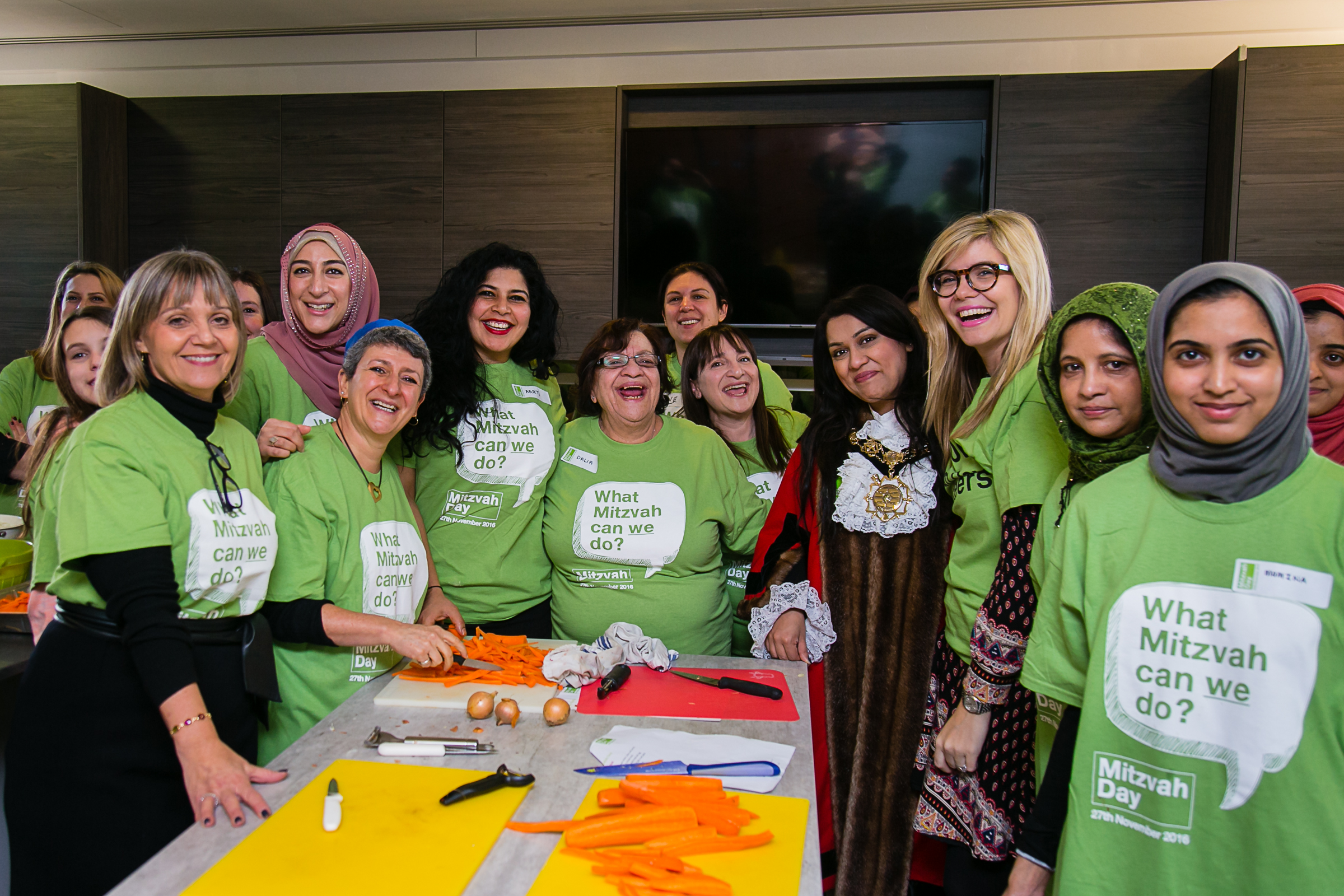
Interfaith work is a great way of building bonds and mutual understanding – whatever your faith or interests. By coming together with neighbours from different faith and cultural communities, we can break down stereotypes, build greater understanding and most crucially: develop trust and love. Give it a go – it’s super fun!
Image: Women of faith cooking food for the local community as part of Mitzvah Day (2016) – a social action project founded by Laura Marks (co-founder of Nisa-Nashim).
2. Be the best friend you can be
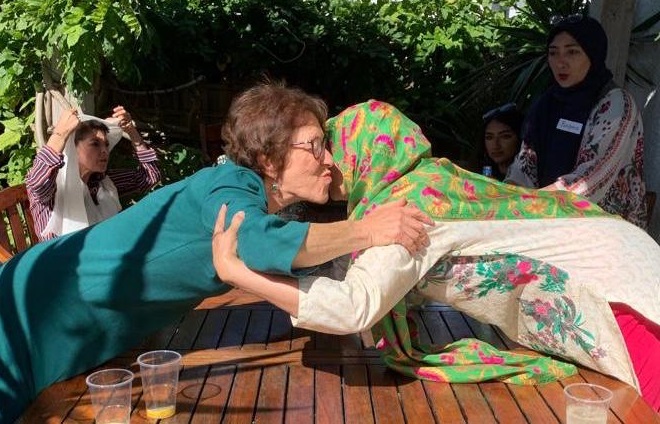
Nisa-Nashim is founded on friendship because interfaith/intercultural relationships critically break down barriers of misunderstanding and help build more inclusive spaces. It’s these friendships that keep us going during tough times. So, stand in your friend’s corner! Call a friend who’s feeling unwell, attend a funeral belonging to a different tradition and show the world how beautiful your friendship is!
Image: Blossoming friendship amongst members of the Nisa-Nashim South-West London group enjoying a recent get-together (2019).
3. Call out negative stereotypes and racist “myths”

It’s critical to be aware of what we’re saying, promoting or even allowing others to express without repercussion. The words we use must demonstrate respect and understanding for other people. So, if you unfortunately hear someone repeating a trope or myth such as: “Oh yes they’re rich – they’re Jewish” (even if no harm is intended): call it out, challenge the person and correct them.
Image: Antisemitic myths around Jews and money have plagued societies for thousands of years and revealed deadly consequences (exemplified in: “Jews, Money, Myth – the Jewish Museum London, 2019).
4. #BeLouder against online hate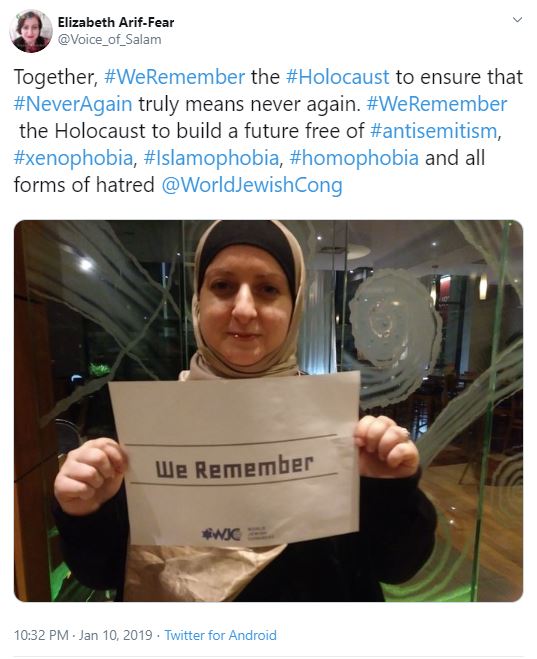
With social media platforms now often a part of our (daily) lives and many a keyboard warrior hiding behind a screen: hate is flooding Twitter. So, remember to also stand up to hate online. Call out hate (like Rachel Riley!), offer a friendly message of support and report hateful content to appropriate bodies such as CST and Tell MAMA and the platform’s management.
Image: Marking Holocaust Memorial Day 2019 – for which I received online abuse from fellow Muslims, demonstrating why it’s so important to challenge hate!
5. Support Holocaust Memorial Day
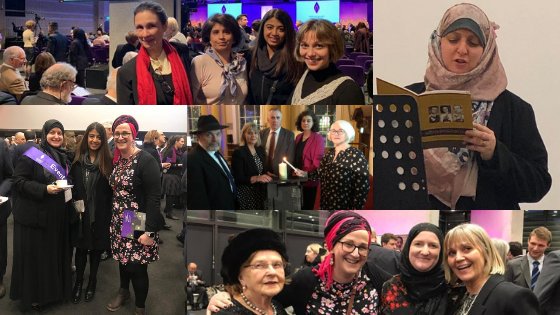
With the horrors of the Holocaust followed by further genocides in Srebrenica, Darfur, Rwanda and Cambodia in the last century alone, marking Holocaust Memorial Day is critical. So join Holocaust Memorial Day Trust for Holocaust Memorial Day and be part of the mass movement to remember the past and Stand Together against hate to help build a safer future for everyone!
Image: Nisa-Nashim members marking Holocaust Memorial Day (2019). The theme for Holocaust Memorial Day (HMD) 2020 is Stand Together – highlighting just how important being an active ally is!
6. Take a trip back in time
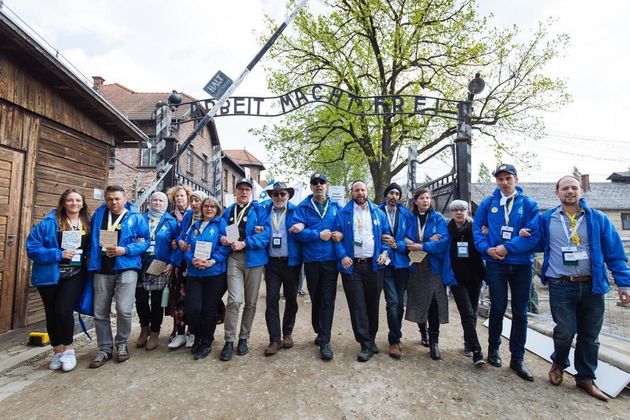 Visiting memorials is a great marker of respect and a critical step to understanding the emotional, social, cultural and political impact of genocide. So, if you can: travel to Auschwitz to learn about the concentration camps, visit the Srebrenica memorial in Bosnia or stand in solidarity at some of the many other sites worldwide. By doing so, you’ll be helping to build a safer future for everyone – one built on tolerance, unity and understanding.
Visiting memorials is a great marker of respect and a critical step to understanding the emotional, social, cultural and political impact of genocide. So, if you can: travel to Auschwitz to learn about the concentration camps, visit the Srebrenica memorial in Bosnia or stand in solidarity at some of the many other sites worldwide. By doing so, you’ll be helping to build a safer future for everyone – one built on tolerance, unity and understanding.
Image: Nisa-Nashim founders Laura Marks and Julie Siddiqi on the March of the Living with an interfaith delegation (Poland, 2019).
These are just a few founding principles behind being an active ally, aimed at ensuring we do not repeat the mistake of the past. As women of Nisa-Nashim, we call on you to join us and become #ActiveAllies. Will you?
About the author:
Elizabeth Arif-Fear is a young British Muslim based in London. As a writer and activist, she is passionate about human rights and interfaith relations. She is a proud member of Nisa-Nashim and co-chair of their Marylebone group, based at West London Synagogue. She tweets at: @Voice_of_Salam
The HMDT blog highlights topics relevant to our work in Holocaust and genocide education and commemoration. We hear from a variety of guest contributors who provide a range of personal perspectives on issues relevant to them, including those who have experienced state-sponsored persecution and genocide. The views expressed are those of the author and do not necessarily represent the views of HMDT.